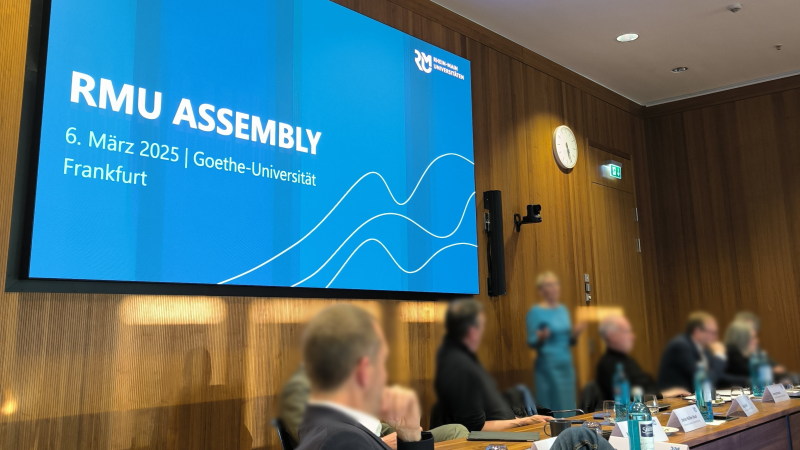Governance
Governance of the RMU: transparent, fair, binding

The RMU is based on the idea of a powerful strategic alliance, led by a team of strong independent partners. Through coordination and close cooperation, the RMU fosters improvement in its core areas: research, teaching, knowledge exchange and transfer, and administration and services. Furthermore, the RMU spurs the structured development of the Rhine-Main area into an integrated academic region.
RMU Board of Directors
The RMU Board of Directors is responsible for the strategic and organizational management and development of the RMU. It is made up of the elected members of the Executive Board of the partner universities. Each year, one of the three presidents takes over the role of spokesperson for the RMU. Prof. Dr. Tanja Brühl of Technical University of Darmstadt started as the first RMU spokesperson on 1 April 2023, the current RMU spokesperson is Prof. Dr. Enrico Schleiff of Goethe University Frankfurt.
Presidents
Prof. Dr. Tanja Brühl (TU Darmstadt)
Prof. Dr. Enrico Schleiff (Goethe University Frankfurt)
Prof. Dr. Georg Krausch (Johannes Gutenberg University Mainz)Executive Boards
Executive Board of Technical University of Darmstadt
Executive Board of Goethe University
Executive Board of Johannes Gutenberg University MainzRMU Office
On March 1, 2023, the RMU Office took up its work under the leadership of Science Manager Marlar Kin. The role of the office is to coordinate the central activities of the RMU. This includes supporting the RMU Board of Directors in the strategic and organizational management and development of the Rhine-Main Universities, supporting the RMU committees, monitoring and managing the RMU's central strategic development projects and cooperation formats, planning and implementing strategic communication, establishing networks within the RMU as well as between the RMU and external partners and the public, and organizing RMU events.
The RMU Office cooperates closely with the staff at management and working levels of the three universities, including the RMU cooperation management. The new office is organized as a as a non-profit limited liability company (gGmbH) under German law, with the universities of the alliance as shareholders.
Contacts:
Marlar Kin, Managing Director (+49 69 247477610)
Katrin Hollerbach, Office and Project Manager (+49 69 247477620)
Julia Ebert, Communications Manager (+49 69 247477630)
Lisa Siegle, Committee and Project Manager (+49 69 247477640)
RMU cooperation management
At each university, a cooperation manager acts as the main point of contact for all RMU matters. The cooperation managers work closely with the RMU Office and all institutions to coordinate joint initiatives and activities.
General email address: koordination@rhein-main-unis.de
TU Darmstadt: Dr. Petra Scheidner (+49 6151-16-20539)
Goethe University Frankfurt: Andreas Karg M.A., M.Sc. (+49 69-798-15192)
Johannes Gutenberg University Mainz: Dr. Eva Werner (+49 6131-39-29547)
The cooperation managers are part of the strategy departments at the respective universities.
Heads of the strategy departments
Dr. Matthias Adam (TU Darmstadt), Directorate I – Strategic Development
Sebastian Keil (Goethe University Frankfurt), Executive Office | Strategic Controlling
Dr. Kerstin Vogel (Johannes Gutenberg University Mainz), President’s Office
RMU Research Council
The RMU Research Council consists of twelve outstanding researchers from the entire spectrum of disciplines represented in the RMU, with each university contributing four members. The Council is appointed by the RMU Board of Directors to advise on and review decisions related to research cooperation and cooperative support of early career researchers. In particular, it participates in the quality control of joint research initiatives and collaborative grant proposals.
TU Darmstadt
- Prof. Dr. Rainer Hähnle (Computer Science)
- Prof. Dr. -Ing. Jutta Hanson (Electrical Engineering and Information Technology)
- Prof. Dr. Markus Löbrich (Biology)
- Prof. Dr. Marc Pfetsch (Mathematics)
Goethe University Frankfurt
- Prof. Dr. Ingrid Fleming (Medicine / Biochemistry and Pharmacology, Physiology)
- Prof. Dr. Cecilia Poletto (Modern Languages)
- Prof. Dr. Klaus Günther (Law)
- Prof. Dr. Harald Schwalbe (Biochemistry, Chemistry and Pharmacy)
Johannes Gutenberg University Mainz
- Prof. Dr. Matthias Neubert (Physics)
- Prof. Dr. Doris Prechl (Ancient Studies)
- Prof. Dr. Daniel Schunk (Legal and Economic Studies)
- Prof. Dr. med. Frauke Zipp (Medicine)
RMU Assembly
The RMU Assembly is made up of elected/appointed members of the three university senates. It consists of twelve professors, three members of the academic staff and three members of the administrative/technical staff, three students and three doctoral candidates. The RMU Assembly accompanies the development of the RMU and comments on issues such as the promotion of Early Career Researchers (ECRs) or plans regarding the further development of the RMU. Members are appointed for two years; as an exception, student representatives can also be appointed for one year.
RMU International Advisory Board
The RMU International Advisory Board advises the RMU Board of Directors on issues relating to the further development of the alliance. It is made up of six representatives from Germany and abroad with international experience in the science system and/or science management. Members are appointed ad personam for a period of five years and can be re-appointed.
- Professor Keijo Hämäläinen (PhD), Tampere University, Finland | President (Keijo Hämäläinen | Tampere universities)
- Prof. em. Dr. Antonio Loprieno, University of Basel, Switzerland | Emeritus (Loprieno Antonio | Faculty of Business and Economics | University of Basel)
- Professor Brad McKay (PhD), University of St Andrews, Scotland | Deputy Principal and Vice-Principal (International Strategy and External Relations) (Management - University of St Andrews Business School - University of St Andrews)
- Professor M. Celeste Simon (PhD), University of Pennsylvania, Philadelphia, United States | Arthur H. Rubenstein, MBBCh Professor at Perelman School of Medicine (M. Celeste Simon | Faculty | About Us | Perelman School of Medicine | Perelman School of Medicine at the University of Pennsylvania)
- Professor Tuula Teeri (PhD), Knut and Alice Wallenberg Foundation, Sweden | Director and Principals' Council Representative
- Dr. Reem Abou Assi, Global Young Academy and Al-Qabas College, Mosul, Iraq | Executive Committee Member of the Global Young Academy (Global Young Academy)
- Professor Keijo Hämäläinen (PhD), Tampere University, Finland | President (Keijo Hämäläinen | Tampere universities)
Spokespersons of the Profile Areas
The RMU research profile brings together four broad RMU profile areas: Data, Health, Matter, and Society. Each profile area is represented by a team of three spokespersons who regularly coordinate with the Vice Presidents for Research. The spokespersons of the profile areas motivate, coordinate, and initiate promising initiatives within their respective profile areas.
Spokespersons of the Profile Areas:
DATA
Prof. Dr. Oliver Hinz (Goethe-University Frankfurt), Prof. Dr. Hanna Kokko (Johannes Gutenberg-University Mainz) und Prof. Dr. Stefan Roth (TU Darmstadt)
HEALTH
Prof. Dr. Heinz Koeppl (TU Darmstadt), Prof. Dr. Ralf Brandes (Goethe-University Frankfurt) und Prof. Dr. Stephan Grabbe (Johannes Gutenberg-University Mainz)
MATTER
Prof. Dr. Peter Stephan (TU Darmstadt), Prof. Dr. Joachim Curtius (Goethe-University Frankfurt) und Prof. Dr. Matthias Neubert (Johannes Gutenberg-University Mainz)
SOCIETY
Prof. Dr. Daniela Grunow (Goethe-University Frankfurt), Prof. Dr. Jan Kusber (Johannes Gutenberg-University Mainz) und Prof. Dr. Julianne Nyhan (TU Darmstadt)
RMU Partnership Board
The RMU Partnership Board advises the RMU Board of Directors in particular on issues relating to the design of cooperation opportunities or the development of structures that enable cooperation in subject areas relevant to research or related to science. In addition, the Partnership Board works jointly with the RMU Board of Directors to increase the visibility and attractiveness of the academic region. The Partnership Board is made up of the heads of the largest non-university cooperation partners of the three partner universities. The members are appointed for four years and can also be reappointed.
Further committees
Additional advisory bodies will be established gradually.



